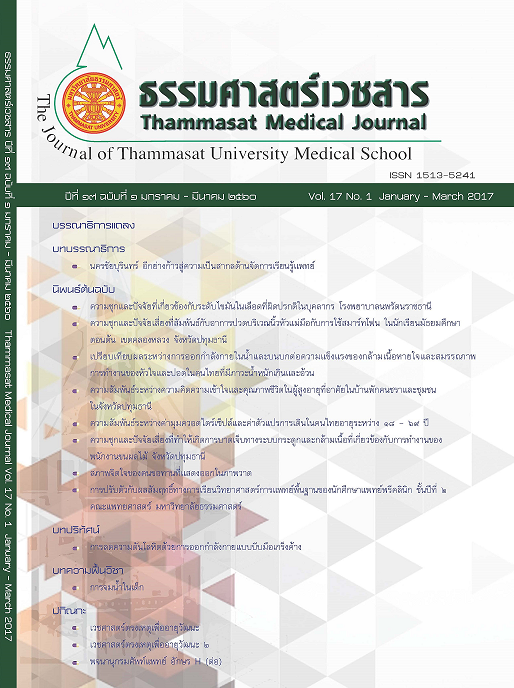Relationship between cognition and quality of life in older people living in elderly care centers and communities in Pathum Thani province
Keywords:
Cognition, Elderly, Well-being, การรู้คิด, ผู้สูงวัย, สุขภาวะAbstract
Introduction: The numbers of older people have been increasingly shown and the tendency of the elders whom have been lacked of caring from family members. This caused depression and the restriction of physical or social engagement activities. It was a risk factor for cognitive impairment leading to decline quality of life in the elderly. This study aimed to find a relationship between cognitive function and the quality of life in older people.
Method: There were forty six participants from elderly care center in Pathumthani and participants from Rangsit community at Thanyaburi, Pathumthani (n = 108). All participants were interviewed by using Mini – Mental State Examination: Thai version (MMSE – Thai 2002) and WHOQOL – BREF – THAI.
Result: There were significantly moderate relationship between cognitive function and environmental domain of quality of life in the older people living in elderly care center (p < 0.05). Significantly moderate relationship was found in between cognitive function and overall and all domains of quality of life in the older people living in Rangsit community.
Discussion and Conclusion: Older people showed a significantly moderate relationship between cognitive function and quality of life. In addition, social currently became a single-family and less interacted with others. This study could be a guideline to reduce risk of cognitive impairment and improvequality of life by stimulating activities and active socialization.
บทนำ: จากจำนวนผู้สูงอายุที่เพิ่มขึ้นเรื่อยๆ และแนวโน้มของผู้สูงอายุที่ขาดการดูแลจากครอบครัวและอยู่ตัวคนเดียวมากขึ้น ส่งผลให้ผู้สูงอายุเกิดภาวะซึมเศร้า มีการทำกิจกรรมทางสังคมหรือกายภาพลดลง เป็นปัจจัยเสี่ยงในการเกิดภาวะความคิดความเข้าใจบกพร่อง และนำไปสู่การมีคุณภาพชีวิตที่แย่ลง การศึกษาครั้งนี้มีวัตถุประสงค์เพื่อหาความสัมพันธ์ระหว่างความสามารถด้านความคิดความเข้าใจกับคุณภาพชีวิตของผู้สูงอายุ
วิธีการศึกษา: มีผู้สูงอายุที่อาศัยอยู่ในศูนย์พัฒนาการจัดสวัสดิการสังคมผู้สูงอายุ จังหวัดปทุมธานี จำนวน ๔๖ คน และผู้สูงอายุที่อาศัยอยู่ในชุนชนใกล้เคียงภายในตำบลรังสิต อำเภอธัญบุรี จังหวัดปทุมธานี (n = ๑๐๘) ผู้เข้าร่วมวิจัยได้รับการสัมภาษณ์โดยใช้เครื่องมือในการคัดกรองคือแบบประเมินสภาพสมองเบื้องต้นฉบับภาษาไทย และเครื่องชี้วัดคุณภาพชีวิตองค์การอนามัยโลกฉบับย่อภาษาไทย
ผลการศึกษา: ความสัมพันธ์ระหว่างคะแนนความคิดความเข้าใจและคุณภาพชีวิตในด้านสิ่งแวดล้อมของผู้สูงอายุที่อาศัยอยู่ในศูนย์พัฒนาการจัดสวัสดิการสังคมผู้สูงอายุมีความสัมพันธ์กันในระดับปานกลางอย่างมีนัยสำคัญทางสถิติ (p < ๐.๐๕) ส่วนความสัมพันธ์ของคะแนนความคิดความเข้าใจและคุณภาพชีวิตในผู้สูงอายุที่อาศัยในชุมชนพบว่ามีความสัมพันธ์กันในระดับปานกลางอย่างมีนัยสำคัญทั้งคุณภาพชีวิตโดยรวม และคุณภาพชีวิตในทุก ๆ ด้าน
วิจารณ์ และสรุปผลการศึกษา:ความสามารถด้านความคิดความเข้าใจมีความสัมพันธ์ในระดับปานกลางอย่างมีนัยสำคัญทางสถิติกับคุณภาพ ชีวิตในผู้สูงอายุ รวมทั้งสังคมไทยในปัจจุบันมีลักษณะเป็นครอบครัวเดี่ยวมากขึ้นและมีปฏิสัมพันธ์กับบุคคลอื่น ๆ ลดลง การทำกิจกรรมต่าง ๆ และการมีส่วนรวมในสังคม จึงเป็นแนวทางหนึ่งในการช่วยลดปัจจัยเสี่ยงต่อการเกิดภาวะความคิดความเข้าใจบกพร่อง และยกระดับคุณภาพชีวิตของผู้สูงอายุ



